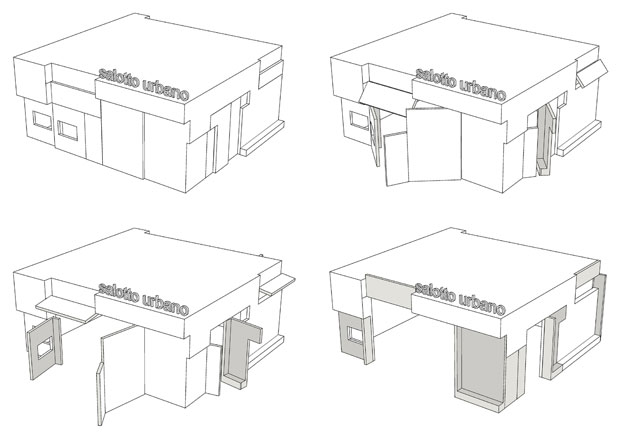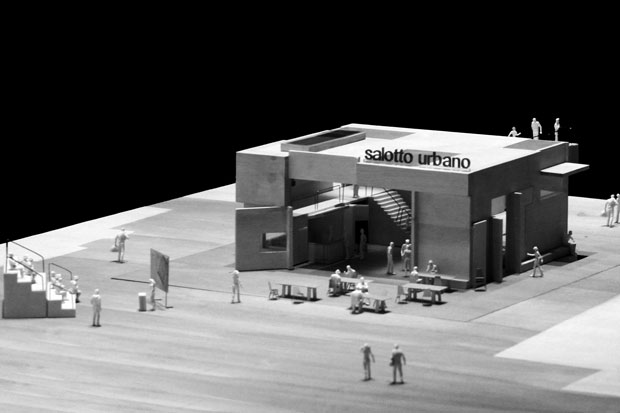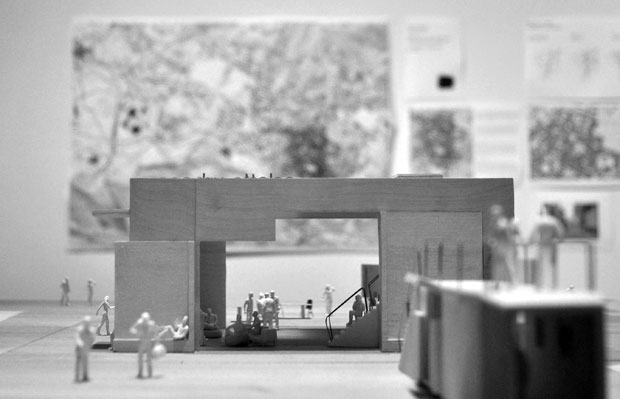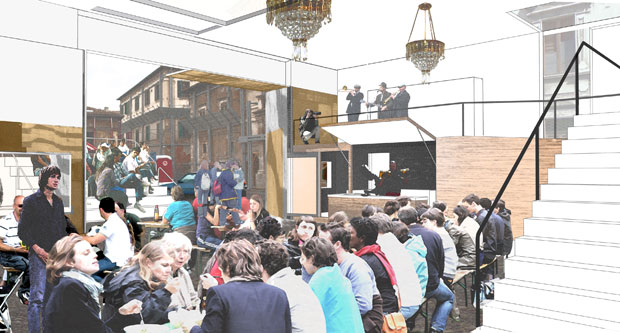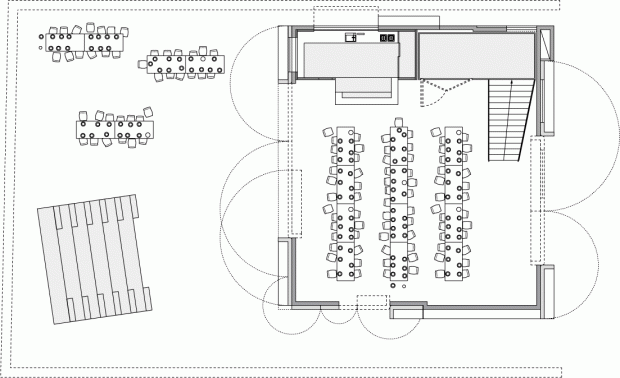SALOTTO URBANO
Das Projekt ist auf Initiative von Dr. Joachim Blüher (Direktor der Villa Massimo in Rom), und Tobias Piller (Journalist) entwickelt worden.
SALOTTO URBANO is an open house for residents and students in L’Aquila. It consists of a shelter that can be opened to all sides, a café/bar, a tribune with a stage, storage and stair element. Different uses such as theatre, discussions, workshops, open-air concerts etc. lead to new ways of interactions in the city. Public space becomes a public stage.
The historic centre of the city of L´Aquila was destroyed by an earthquake in April 2009. The unclear situation of the reconstructing process in many parts of the city is the reason why the centre is now – 2 years later – still hardly accessible. That situation caused great displeasure and frustration amongst the population of L´Aquila.
Das historische Zentrum von L’Aquila wurde im April 2009 bei einem Erdbeben weitgehend zerstört. Die in vielen Teilen ungeklärte Situation über den Wiederaufbau des historischen Stadtzentrums der Stadt L’Aquila hat dazu geführt, dass die Stadt nach wie vor fast nicht zugängig ist. Das und die wenig transparente Planung und Strategie des weiteren Wiederaufbaus führen zu Unmut und großer Frustration seitens der Bevölkerung.
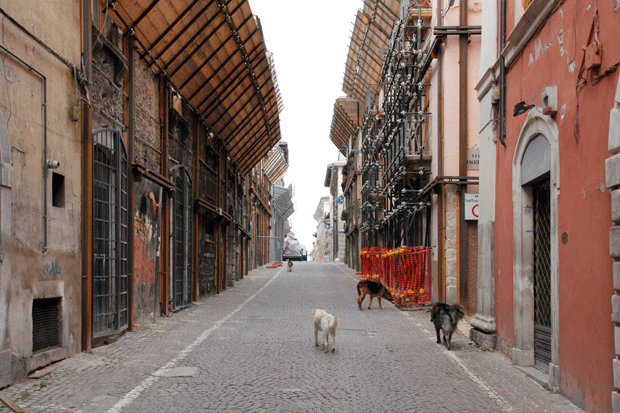
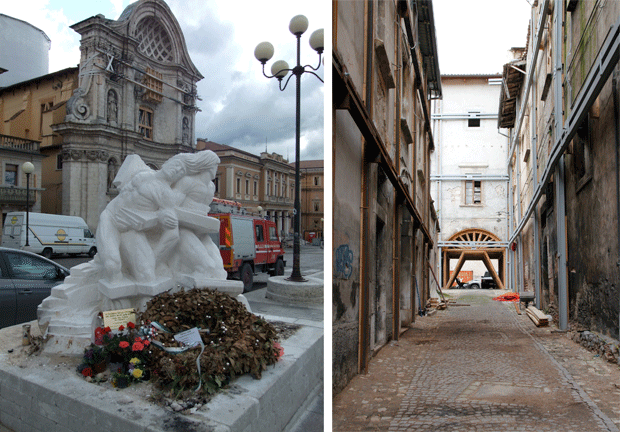
L’Aquila si apre
Therefore we suggest to reopen the city as soon and wide-ranging as possible – to present new perspectives for the inhabitants of L`Aquila and to regive them social self-control. Even if the reconstruction of the city will last for several more years, it’s necessary to develop a new planning strategy that enables the citizens to reuse and reoccupy the city step by step. We suggest starting this strategy on the city squares, because they are mostly in a good condition and accessible. Shops could be reopened there and people could begin to observe what’s happening in their city.
Um den Menschen wieder eine Perspektive zu vermitteln und um die soziale Kontrolle zurück an die Bewohner von L’Aquila zu geben, schlagen wir vor, die Stadt so schnell und so weiträumig wie möglich wieder öffnen. Auch wenn der Wiederaufbau noch viele Jahre dauern wird, muss man jetzt eine Planungsstrategie erarbeiten, wie es möglich ist, Schritt für Schritt die Stadt wieder zu benutzen und zu bewohnen.
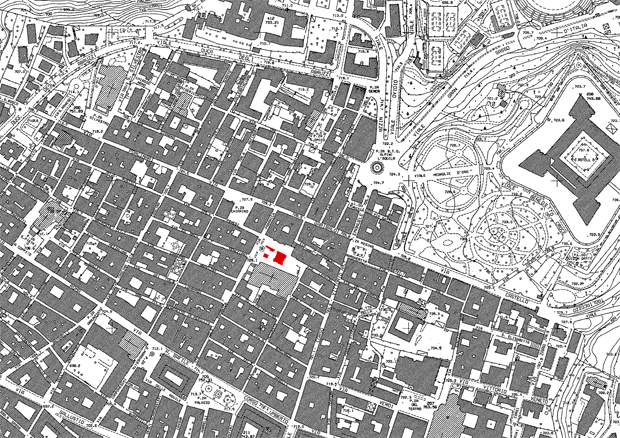
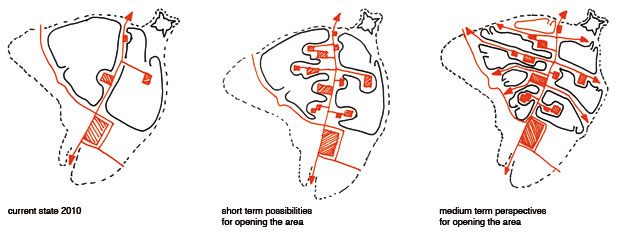
Die Plätze L’Aquilas
Unsere Idee ist dabei von den Plätzen L’Aquilas auszugehen. Passend zur Geschichte der Stadt wollen wir beginnen die Plätze der Stadt wieder zu beleben und dadurch die Stadt zu reanimieren. Auch wenn Sanierungen länger dauern, ist der Platz schon begehbar und dadurch ein Stück Stadt zurückerobert. Geschäfte könnten wieder eröffnen und die Menschen sähen gleichzeitig wo und was passieren würde.
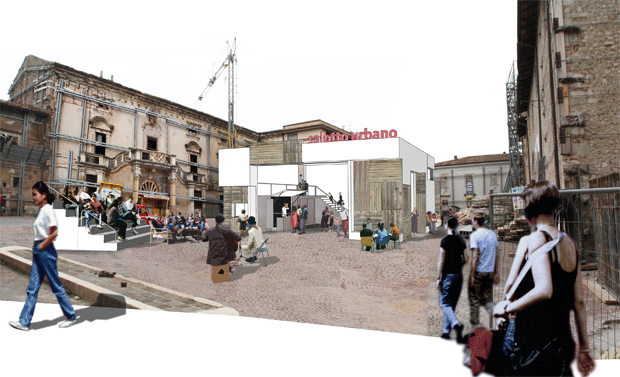
L’Aquila is a city with 20.000 students among a total population of 70.000. With this in mindww “Salotto urbano” is supposed to be a space for new possibilities within the city that reconnects them to urban life. The construction of the building is supported by participation. Due to various uses such as theatre, discussions, workshops, open-air concerts etc. new ways of interactions in the city can be initiated.
The “Salotto urbano” consists of a shelter that can be opened to all sides, a café/bar, a tribune with a stage and a storage and stair unit. With these elements the interior and exterior space can be used in various ways. According to the seasons, “Salotto urbano” opens up and folds its interior parts inside out. Public space becomes an urban stage.
In L’Aquila gibt es rund 20.000 Studenten bei einer Einwohnerzahl von ca. 70.000 Bewohnern.
„Il Salotto“ soll insbesondere für sie einen neuen Möglichkeitsraum in der Stadt bieten und wieder an das städtische Leben an knüpfen. Der Aufbau wird durch Partizipation unterstützt. Durch die verschiedenen Nutzungen, Theater, Diskussionen, Workshops, Open Air Konzerte etc. beginnt eine neue Interaktion zwischen Platz und Stadt.
Das offene Haus besteht aus einer aufklappbaren Hülle, einem Cafe/Bar, einer Tribüne +Bühne, einem Lager- und Treppenelement. Mit diesen Elementen kann der innere und äußere Raum in verschiedenen Variationen bespielt und benutzt werden. Entsprechend den Jahreszeiten öffnet sich der „Salotto urbano“ und klappt sein Inneres nach außen. Der öffentliche Raum wird zur Stadtbühne.
